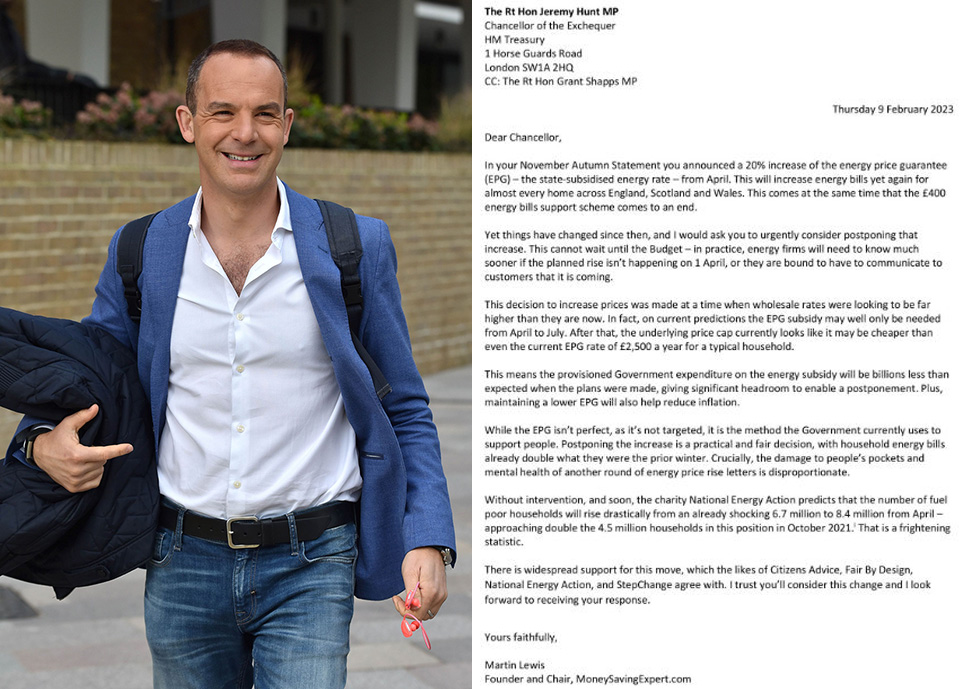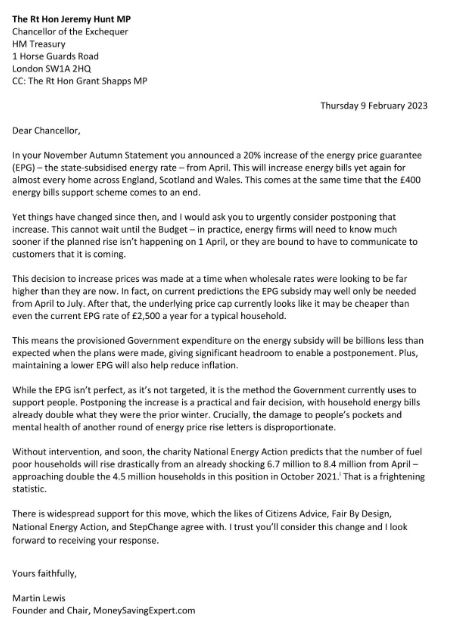Martin Lewis pens candid letter urging gov't not to raise energy cap to £3k
The money expert says adding around £500 a year to people's energy bills from April will cause fuel poverty — and comes at a time when wholesale energy prices are expected to drop

Martin Lewis has written an open letter to the Chancellor urging him to postpone raising the energy price cap from £2,500 to £3,000 in April.
The Chancellor announced during the Autumn Statement last year that the Energy Price Guarantee (EPG), which currently caps electricity prices at 34p per kWh and gas at 10p per kWh, will rise in April 2023 by around 20%. The rise coincides with the end of the £400 energy grant, leaving households significantly worse off when it comes to paying their energy bills.
Lewis, known for his energy saving tips, points out that when the cap rise to £3,000 was announced, energy prices were being forecast to continue to increase throughout 2023. But since then, the climate has changed and the cap rise in April will come at a time when energy prices are expected to fall, as stability returns to the markets.
Here's what he told the Chancellor in his letter, which was published to Twitter with the support of several charities.
What does Martin Lewis say in his letter?
Martin Lewis gets straight to the point in his letter highlighting that raising the Energy Price Guarantee to £3,000 in April will plunge already struggling British households into more debt. Because of this, as well as new forecasts predicting an energy price fall rather than rise later this year, he says there is a compelling case to postpone the 20% cap increase.
"This decision to increase prices was made at a time when wholesale rates were looking to be far higher than they are now,"Lewis writes in the letter, posted to his Twitter account.
"In fact, on current predictions the EPG subsidy may well only be needed from April to July. After that, the underlying price cap currently looks like it may be cheaper than even the current EPG rate of £2,500 a year for a typical household."
Get the Homebuilding & Renovating Newsletter
Bring your dream home to life with expert advice, how to guides and design inspiration. Sign up for our newsletter and get two free tickets to a Homebuilding & Renovating Show near you.
In the letter he says another 1.7 million households will fall into fuel poverty if the cap goes ahead in April — a total of 8.4 million homes across the UK. The charity Nation Energy Action says 6.7 million are already in fuel poverty due to the energy crisis.
Citizens Advice, Fair By Design, StepCharge as well as Nation Energy Action have all backed Martin Lewis's proposal in the letter.
You can read the letter in full below:

What will the energy price cap be this year?
Martin Lewis's note to Jeremy Hunt follows recent energy price cap predictions from Cornwall Insight that suggest Ofgem's energy price cap will end up lower than the government's energy price cap from July this year.
The predictions estimate Ofgem's cap to be set at £2,361.96 between July and September, slightly increasing to £2,389.31 between October and December. Both figures will be lower than the £3,000 Energy Price Guarantee cap that takes affect from April.
If this happens, and the Ofgem energy price cap ends up lower than the Energy Price Guarantee cap, our understanding is that the lower of the two caps will apply to consumers. An official announcement will be made by Ofgem on February 27th.

Amy spent over a decade in London editing and writing for The Daily Telegraph, MailOnline, and Metro.co.uk before moving to East Anglia where she began renovating a period property in rural Suffolk. During this time she also did some TV work at ITV Anglia and CBS as well as freelancing for Yahoo, AOL, ESPN and The Mirror. When the pandemic hit she switched to full-time building work on her renovation and spent nearly two years focusing solely on that. She's taken a hands-on DIY approach to the project, knocking down walls, restoring oak beams and laying slabs with the help of family members to save costs. She has largely focused on using natural materials, such as limestone, oak and sisal carpet, to put character back into the property that was largely removed during the eighties. The project has extended into the garden too, with the cottage's exterior completely re-landscaped with a digger and a new driveway added. She has dealt with de-listing a property as well as handling land disputes and conveyancing administration.
